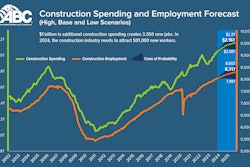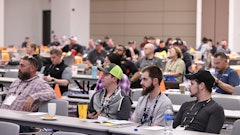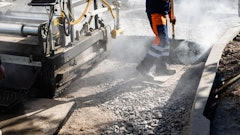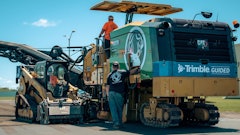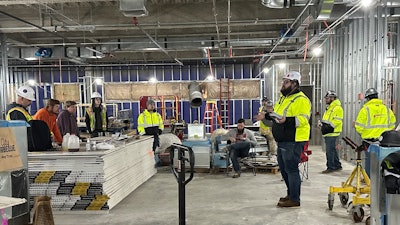
In her 2021 book Recovery Allies, author Alison Jones Webb describes the crucial role recovery allies play in addressing addiction in our communities. Jones Webb states that a “recovery ally is a passionate supporter of and advocate for individuals in recovery and for the recovery community as a whole.” Jones Webb asserts that allies deploy their “assets, skills, resources, and connections to work side by side with the recovery community to build recovery-friendly communities.” She describes how allies “create safe spaces to talk about addiction and recovery”.
A previous article in this series highlighted the benefits of the Building Trades Recovery Week celebration that started in New England in 2019. A hallmark of the program is destigmatizing recovery and offering professional services and peer support for recovery. An increasing number of organizations throughout the construction industry are offering peer support programs. This is occurring in unions as well as in large, medium, and small-sized businesses in both union and non-union organizations. This article highlights two leading examples of such programs.
Mid-City Electric/Technologies,
Advocates Peer Support Program (Westerville, Ohio)
Mid-City Electric started in 1960 as a full-service union electrical contractor specializing in commercial, industrial, and institutional installations. Mid-City Electric has grown a large presence in Central Ohio with approximately 550 field employees and approximately 70 office administrative staff. The Advocates Peer Support Program launched with its first meeting on March of 2023.
Two key employees are leading the efforts for Mid-City Electric. Paul Lawson is a Risk Management Coordinator and the Lead Mental Health Advocate for Mid-City Electric. Lawson has been a passionate leader in the areas of mental health, wellbeing, and suicide prevention. Monica Poirier is a Marketing Manager who is also a Certified Professional Trainer who provides support in fitness, nutrition, and community support. With support and guidance from the company’s Human Resources Director and Operations leaders, Lawson and Poirier have built an engaged peer support program.
Lawson describes the purpose of the Advocates Team is “to provide community and additional training for a diverse group of construction professionals (office and field) who desire to normalize help-seeking and help-giving behavior in the industry.” Lawson praises these motivated “individuals who desire to dive deeper in advocacy knowledge and grow their ability to care for those around them”.
Approximately 25-30 employees have volunteered to be trained to be part of the peer support program. Lawson and Poirier provide the members of the Advocates Peer Support Program opportunities for learning and coaching in key areas, including:
- Learning in active communication skills
- Access to national, local, and company resources and updated research and data
- Coaching on how to engage with the resources
- Print material such as 988 stickers
- Information cards regarding the Employee Assistance program (EAP)
- Training on Vital Cog and Question-Persuade-Refer (QPR) techniques for suicide prevention
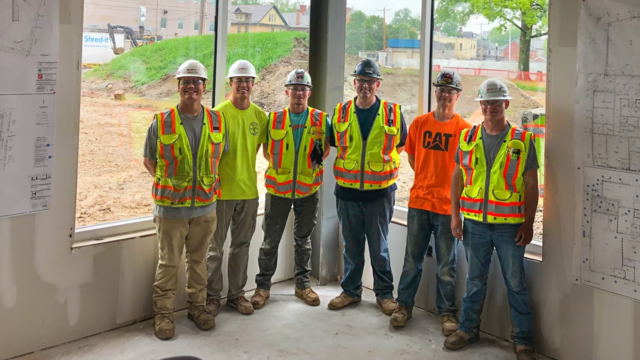 Brian Finck (middle left) is General Foreman at Mid-City Electric in Columbus, Ohio and one of the Mental Health and Wellbeing Advocates for Mid-City. Brian Finch (middle right).Mid-City Electric/Technologies | Photo by Nathan Crawford
Brian Finck (middle left) is General Foreman at Mid-City Electric in Columbus, Ohio and one of the Mental Health and Wellbeing Advocates for Mid-City. Brian Finch (middle right).Mid-City Electric/Technologies | Photo by Nathan Crawford
Lawson described two major successes of the Advocates Peer Support Program. The first involved a peer advocate coordinating and organizing a stand-down on their project site to focus on workplace well-being. Lawson said this Advocate “reached out, set up the date and time, and provided print material from our Advocates Team meeting. He also used the opportunity to model vulnerability for his crew by telling his own personal story around seeing a therapist.” The second success centered on another advocate working on a large data center project who “routinely engages in one-on-one conversations with field workers who share they are struggling.” This Advocate participated in training on active listening skills and Lawson said he leverages these skills “to create opportunities for co-workers to feel heard, thereby creating opportunities to share resources.”
Lawson highlighted how the peer support program organically evolved to include addiction and opioid risk reduction. One of the goals for the Advocates team is to “promote help-seeking and help-giving behavior in the construction industry”, said Lawson. Mid-City’s Advocates program initially focused on addressing wellness and suicide prevention. Lawson proclaimed that “when the CDC data came out showing the high overdose death rates in construction, we could not ignore that. It became a responsibility to include that topic in our trainings and discussions.”
Lawson said he is proud of the Advocates Program and all the volunteers. He said he is “encouraged seeing peer leaders emerge to support worker wellbeing initiatives.” Lawson humbly stated that “he always saw the Advocates Team as the core of our program, even before the group began.” Lawson expressed that he knew that “he and Poirier alone were only going to be able to do so much developing this program. The Advocates team has become the hands and feet of our movement here at Mid-City Electric. I couldn't be prouder of everyone in this group.”
Local #825 Member Assistance Program,
International Union of Operating Engineers (New Jersey)
The Member Assistance Program (MAP) for Local #825 officially started in 2019 after a “soft launch” in 2017. At the 2017 convention of the International Union of Operating Engineers (IUOE), Kyle Zimmer from Local #478 in Connecticut led a presentation on peer-to-peer support services. The IOUE encouraged locals throughout North America to offer support to members. The Local #825 MAP is coordinated by Business Agent Chris Lalevee who is a Certified Peer Recovery Specialist. Chris is the co-director of the IUOE’s national peer support training program along with Zimmer.
Lalevee has over 25 years in heavy and civil construction as an operator, instructor, mentor, and coach. He is active nationally with SAFE Project, Construction Suicide Prevention Week, and the Construction Industry Alliance for Suicide Prevention. He openly shared lived experiences with personal mental struggles he experienced through young adulthood. The Local #825 MAP serves almost 8,000 members and dependents of the Health and Welfare Fund. The number served includes spouses and children of members, as well as retirees. Retirees often contact the MAP for support in handling issues relating to their grown adult children and/or grandchildren.
Lalevee shared that “it seems that it is becoming easier and more accepted for members and families to seek support than suffering in silence facing struggles alone”. Lalevee shared that “it always amazes me to have the awkward conversation with the employer” when he is helping a worker. “The amazing part is the sigh of relief, admitting they had a feeling and admitting they didn’t know how to approach the issue”.
Lalevee proclaimed the “MAP has proven to be an effective way of supporting members and their families facing addiction”. Lalevee stated, “when someone reaches out to MAP, he discusses the issue and what the best avenue is for where this person is at this time. Sometimes this means speaking with spouses or the whole family”. “When the person commits to recovery”, Lalevee says the goal is “to get them into one of the in-network facilities that have been audited and pre-approved. We want to be sure the person is getting the highest level of care as well as good and clean amenities”.
Supporting members while they are in treatment is an important part of Lalevee’s role as MAP Coordinator. Lalevee says he “takes care of whatever I can do for them. The support helps take the edge off and reduces the stress. This allows them to focus on what they need to do”. As a person is engaged in recovery care, Lalevee shared examples of representative services he offers to support the person and family, including:
- Meeting with members and family members to describe addiction support, detox, treatment options, support, medication-assisted treatment, and aftercare programs
- Meeting with doctors and other addiction support specialists and treatment centers to know the best providers for referrals to members
- Scheduling outpatient services and aftercare support
- Arranging rides to and from work
- Finding recovery housing
- Connecting individuals with the recovery community peers within Local #825
- Participating in the weekly Sunday morning virtual recovery meeting
Lalevee said he is “excited by the traction of the MAP”. Lalevee commented, “the growing number of volunteer peer leaders have come from the membership ranks of those who have received help”. He said that “many of these individuals have a desire to pay it forward to help others and have become peers as well”. Lalevee highlighted that he continues to “see headway with how the workforce, contractors, and associations are all embracing the benefits of the MAP approach and this is how we will change the industry while helping people – and, even saving lives”.






